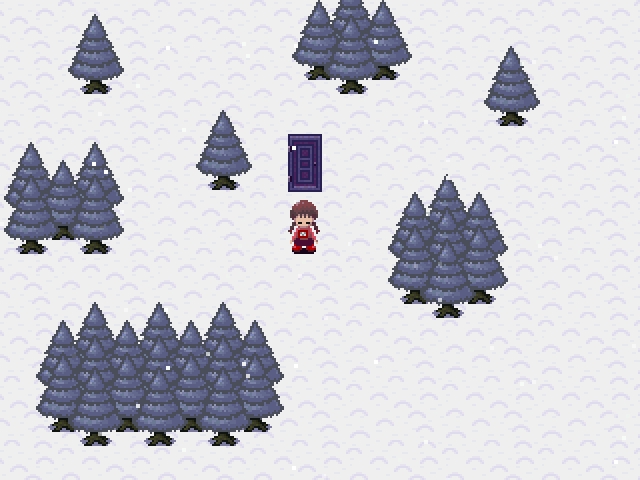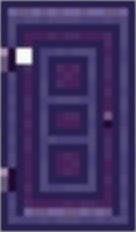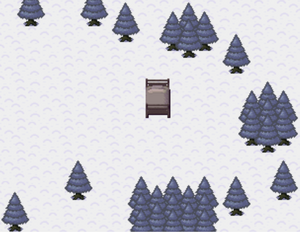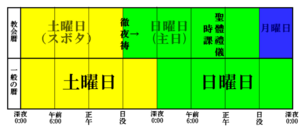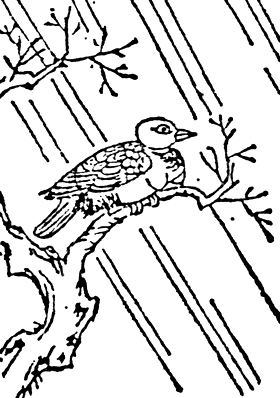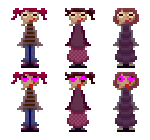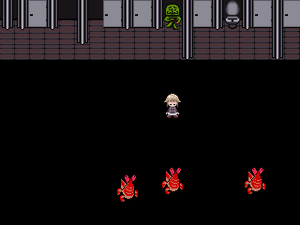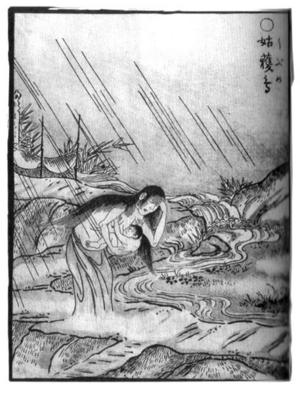Snow World(Liturgical colours)
※"Snow World's door" is Liturgical colours Purple(Advent&Sacrament) and White(Christmastide&Easter Season)?
Post-1969 Rubrics
In the Roman Rite, as reformed by Pope Paul VI, the following colours are used.[1]
| Color | Obligatory Usage | Optional Usage (in lieu of prescribed obligatory colour) |
|---|---|---|
| Violet |
|
|
| White |
|
※Relevance of "Christmas" and "Snow World's Bedroom"
|
※If "madotsuki" has suggested that it is a "pregnant woman" like Virgin Mary of "Christmas"?
http://yumenikki.wikia.com/wiki/Snow_World(name)#Toriningen.28.E7.94.A3.E5.A5.B3.29
Snow World(Advent)
1 Traditions 1.1 Liturgical Colors
See also: Liturgical colours
The usual liturgical colour in Western Christianity for Advent is either purple or blue.[4] The purple color is often used for hangings around the church, the vestments of the clergy, and often also the tabernacle.
Proponents of this new liturgical trend argue that purple is traditionally associated with solemnity and somberness, which is fitting to the repentant character of Lent. On the 3rd Sunday of Advent, Gaudete Sunday, rose may be used instead, referencing the rose used on Laetare Sunday, the 4th Sunday of Lent.

Snow World(Sacrament of Reconciliation)
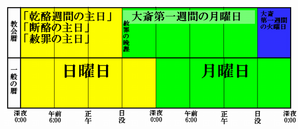
※Relevance of "Quinquagesima(Sacrament of Reconciliation) Sunday" and "Easter Sunday"
http://yumenikki.wikia.com/wiki/Effects(name)#Effects.28Easter_egg.29
Yuki-onna(Yuki-onna)
Yuki Onna (雪女?, snow woman) is a spirit or yōkai in Japanese folklore. She is a popular figure in Japanese literature, manga, and animation.
Yuki-onna appears on snowy nights as a tall, beautiful woman with long black hair and blue lips. Her inhumanly pale or even transparent skin makes her blend into the snowy landscape (as famously described in Lafcadio Hearn's Kwaidan: Stories and Studies of Strange Things). She sometimes wears a white kimono,[3] but other legends describe her as nude, with only her face and hair standing out against the snow.[4]
※Effects(Yuki-onna) can also make a snowstorms.
http://yumenikki.wikia.com/wiki/Effects#Yuki-onna
In many stories, Yuki-onna appears to travelers trapped in snowstorms, and uses her icy breath to leave them as frost-coated corpses. Other legends say she leads them astray so they simply die of exposure. Other times, she manifests holding a child. When a well-intentioned soul takes the "child" from her, they are frozen in place.[3]
Yuki-onna(雪女)
2 逸話 (2 Anecdote of Yuki-onna)
また、姑獲鳥との接点も持っており、吹雪の晩に子供(雪ん子)を抱いて立ち、通る人間に子を抱いてくれと頼む話が伝えられる。その子を抱くと、子がどんどん重くなり、人は雪に埋もれて凍死するという[3]。
In addition, we also have contact with "姑獲鳥", to ask me to talk to the man standing holding a child holding a child ("雪ん子") on the night of the snowstorm, is transmitted through. And embrace the child, the child becomes more and more serious, is that people freeze to death and buried in snow [3].
※Relevance of "姑獲鳥" and "雪ん子", from Anecdote of Yuki-onna(雪女)
Kamakurako(雪ん子)
※If "Kamakurako" is 雪ん子, she is child (embryo who is in a belly) of "Madotsuki(Yuki-onna)"?
雪ん子(ゆきんこ)
Children of Yuki-onna (Yuki-n-ko)
- accuracy of snow appearance of a child. Doji Snow (Yukiwarashi)
- Children of Yuki-onna specter of Japan. See story # fairy.
Toriningen(姑獲鳥)
2 日本の伝承との関連(2 The context of the tradition of Japan)
江戸時代初頭の日本では、日本の伝承上の妖怪「産女」が中国の妖怪である姑獲鳥と同一視され、「姑獲鳥」と書いて「うぶめ」と読むようになったが、これは産婦にまつわる伝承において、産女が姑獲鳥と混同され、同一視されたためと見られている[4]。
Although the supernatural creature "産女" on the tradition of Japan is identified with "姑獲鳥" which is a Chinese supernatural creature, writes it as "姑獲鳥" and came to read with "うぶめ" in Japan of the beginning of the Edo period(1603–1868), in the tradition related to a woman in labor, "産女" is confused with "姑獲鳥", and since it has been identified in the same category, this is seen [4].
※Relevance of "姑獲鳥" and "雪ん子", from Anecdote of Yuki-onna(雪女)
http://yumenikki.wikia.com/wiki/Snow_World(name)#Yuki-onna.28.E9.9B.AA.E5.A5.B3.29
Toriningen(産女)
Ubume (産女?), a Japanese yōkai,[1] appears in folk stories and literature as an old woman or Crone, with a child in her arms, imploring the passerby to hold her infant, only to then disappear.[2]
※”Kamakurako(baby)” was taken by ”Toriningenn(産女)"?
唐の『酉陽雑俎』前集巻16および北宋の『太平広記』巻462に載せる「夜行遊女」は、
The "夜行遊女" who appears in the Part 16th of the collection of "酉陽雑俎" in 唐国, and the Part 462 of "太平広記" in 北宋,
人の赤子を奪うという夜行性の妖鳥で「或言産死者所化(或いは産死者の化せる所なりと言う)」とされる。
It is a bird of the nocturnal supernatural creature of taking people's baby,
It is considered as "或言産死者所化 (Or called the figure in which person with stillbirth transformed itself)."
※"Madotsuki" was dropped in a pool of blood as "Hell", Because that "pregnant women(Madotsuki)" to be dead?
http://yumenikki.wikia.com/wiki/Snow_World#Trivia
産女が血染めの姿なのは、かつて封建社会では家の存続が重要視されていたため、死んだ妊婦は血の池地獄に堕ちると信じられていたことが由来とされる[1]。
In a feudal society, since importance was once attached to continuation of the house that "産女" is a blood-stained figure, it is considered as the origin that it was believed that the dead pregnant woman fell to the torture of Blood Pond [1].
※If "Kamakurako" is 雪ん子, she is child (embryo who is in a belly) of "Madotsuki(Yuki-onna)"?
http://yumenikki.wikia.com/wiki/Snow_World(name)#Kamakurako.28.E9.9B.AA.E3.82.93.E5.AD.90.29

